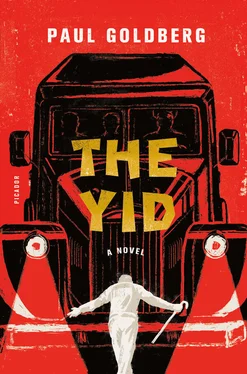* * *
Though no official tallies of such things exist, most sexual encounters in Magnitogorsk were vertical: in the bushes, behind the bread store, leaning against a shed. There were no trees.
The city was a construction camp, an amalgamation of barracks, tents, and prison zones. The foreigners lived better than the Russians, but Lewis didn’t have a room until Bunyan’s intervention made him a brigadir .
That night, their lovemaking was horizontal, atypically unhurried. He woke up before dawn, before the sound of the combinat horn that punctuated his life.
She would leave for Moscow later that morning.
He ran his calloused fingers through her thick, dark hair. He kissed her eyelids, first one, then the other.
“Paul Robeson,” she said, waking up. That would become her name for him.
Paul Robeson. A Russian-speaking Negro who gave his voice to the working men. A Yiddish-speaking Negro. A hero of the Left. An athlete, actor, musician, champion of the oppressed, a Red Othello. There were worse names to call a man — and in America, Lewis was called those names, as was Paul Robeson.
* * *
After seeing that responsible comrades at the Regional Committee of the Party gave him a motorcycle for the five-kilometer trip to the airstrip, Mikhoels slathered a thick layer of TeZhe cream onto his face, to prevent frostbite. In his shoes, which were more appropriate for the boulevards of Paris than for the snowdrifts of Magnitogorsk, he was at the very least guaranteed a cold.
Tatyana returned to the hotel after dawn. They had two adjoining rooms, for they had been, for quite some time, intimate.
Tatyana’s role in preparing the production of Kinig Lir was never acknowledged. She was the last person in the translation process. The Yiddish text was completed by the poet Shmuel Halkin. Halkin’s verse tended toward elegant Hebraic form. Academic translations of Lear into Russian were dead, unacceptable. Poetic translations were textually unreliable. Halkin spoke Russian, but no English or German. (There were many excellent translations of Shakespeare into German.) Mikhoels spoke German, but no English. The director, Sergei Radlov, spoke some English, but only a little Yiddish.
“Halkin had to be watched closely, in part because his excessive fondness for ‘biblical stylistics’ threatened to overwhelm other important characteristics of Shakespeare’s style,” Mikhoels wrote in one of his many essays on the subject of his own achievements.
Working from Russian translations, Halkin refused to distinguish Shakespeare’s prose from the iambic pentameter, and had to be stopped from converting the entire play into verse.
Phrase by phrase, the three men fought their way through the text, transforming King Lear into Kinig Lir , keeping what they could, sacrificing what they had to. Not even Halkin and Radlov were told that at night, Mikhoels sat down (and, yes, sometimes reclined) with a language student, and went through the play line by line, comparing the Yiddish and English texts.
In those days, the trip back from Magnitogorsk could take days, largely because the single-track railroad was chronically bottlenecked. After obtaining a mandate from Yefim Zeitlin, head of the Comintern offshoot for youth, Mikhoels commandeered a military plane to simplify his hunt for Comrade Jim.
Much is said about high party officials who used their positions for personal enrichment or for fixing problems for their friends and family. Commissar Yefim Zeitlin was not like that. Finding a military plane for Mikhoels and a collaborator was part of Zeitlin’s official duties to facilitate production of propaganda materials aimed at America’s Negro population.
* * *
The pilot, Grisha Gershenson, greeted them in Yiddish. Grisha grew up in Boston, speaking English, Yiddish, and Russian. When he emigrated to the USSR with his parents at age seventeen, he had dreams of becoming a test pilot, but instead became a glorified taxi driver on Comintern missions.
The scene he witnessed that morning figures in his unpublished memoir.
Tatyana opened an old tome of the Falstaff edition of Shakespeare. Mikhoels opened the manuscript in a yellow folder.
“Me hot zi ufgehangen,” he read. They’ve hanged her.
“It’s not in the original,” said Tatyana.
“How does it begin?”
“In English: ‘And my poor fool is hanged: no, no, no life?’”
Tatyana translated these words literally into Yiddish.
“Too much all at once,” said Mikhoels.
“Halkin gives us a simplistic declaration not rooted in the text.”
“Yes, but it gives us an image we can relate to. They’ve hanged her! And we see that she has indeed been hanged! Her body is right there. Onstage. And we think of people we knew who have been hanged, and of people who are being hanged, and of those who will be hanged. And we imagine ourselves trading places with them.”
“Yes, but you aren’t doing Shakespeare.”
“Maybe you are right. And if you are, so what? I set my stage for the audience I have. Translate what Shakespeare wrote, and the audience will think my character is insane.”
“He is.”
“Not in this scene! Here, he experiences grief, actively, painfully, slowly. Rush through it, and he’ll become what? English?”
Gershenson writes that at that point Mikhoels wiped off a tear, which the pilot attributed to the cold winds of Magnitogorsk.
“ Mayn narele, mayn lets, dos lebn hot / Shoyn mer keyn vert far mir,” Mikhoels continued. My little fool, my clown / Life has no longer any value to me.
“This, too, is not in the text,” said Tatyana. “Here, he uses the diminutive suffix for fool, narele , instead of kleine nar , little fool. Then he repeats himself by calling his narele his clown, lets . We already know that Nar is a clown. That’s his job. By now we’ve seen everything but the concluding scene.”
“I like the sound of it,” said Mikhoels. “It repeats the point … narele … lets … diminutives accentuate the weight of his loss. Little is big. Big is little. I don’t know how the English feel their losses. This is for us:
“Me hot zi ufgehangen.
Mayn narele, mayn lets, dos lebn hot
Shoyn mer keyn vert far mir.”
He continued reading:
“… A ferd, a hunt,
A moyz — zey lebn oykh, un du, mayn kind,
Du otemst nit, du vest shoyn mer tsu undz
Nit umkern zikh keynmol … keynmol … keynmol.
Ikh bet aykh, Ser, tseshpilyet mir ot do.
Azoy. A dank. Ir zet? O, tut a kuk.
Di lipn ire … zet … nu … kukt zikh ayn …
“‘I feel my losses slowly, I give myself permission to dwell on them,’” Mikhoels continued.
“Like Kinig Lir,” she said.
“Like Kinig Lir.”
“And then he dies.”
“And then I die…”
Gershenson notes that Tatyana and Mikhoels were in tears by the time his plane touched down for refueling in Sverdlovsk. He attributes this to the power of Mikhoels’s first performance of the final words of Kinig Lir .
* * *
Through Tatyana, Lewis accepted a new language, another family, life beyond pigmentation.
Tatyana introduced him to Moscow: stage, directors, writers, actors. Lewis discovered — and met — Meyerhold, Stanislavsky, Bulgakov. He met Zuskin, and Tanya’s uncle Solomon Levinson. He saw Kinig Lir on opening night in 1934, the two hundredth performance in 1938, and many performances in between.
In 1938, after Lewis completed training in engineering, he received a package from Magnitogorsk: a box of twelve shirts, six white and six blue, made of sturdy American cotton. Also, there was a new black tie and a note:
Читать дальше












